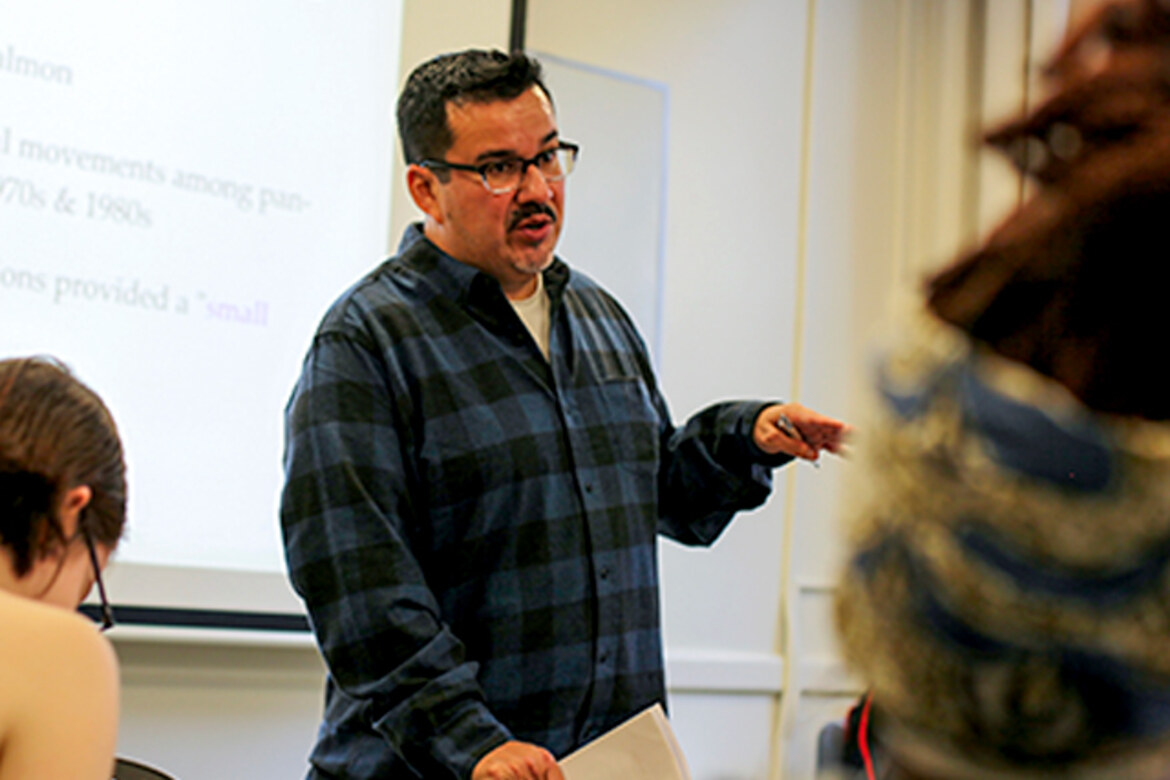Volunteers help students at Homework House

Mount Holyoke College undergraduates volunteer at Homework House, tutoring elementary school students in the city of Holyoke.
By Sonia Paul
Luisa Linares ’22 was a first-year student at Mount Holyoke College riding the PVTA bus to a tutoring job she had arranged through the Community-based Learning program when she first heard about Homework House.
Other students on the bus were tutors at the nonprofit academic and mentoring program that caters to the city of nearby Holyoke’s working-class communities, particularly its large Puerto Rican diaspora, and they spoke positively about their experiences.
So when Linares, now a junior majoring in French, minoring in gender studies, and taking a global business Nexus concentration, was considering which work-study jobs to take on this semester, tutoring — particularly at Homework House — seemed like a natural move.

“It seemed like an opportunity to go back to what I originally started with,” said Linares, who was born in the Dominican Republic and raised in Miami before moving north to study at Mount Holyoke. “During COVID I felt very lost, like, what do I do now. There was no sense of familiarity. Going back to a CBL program helped me think back to a time where things weren’t as crazy. So it was just kind of going back to this time where I was helping kids.”
Linares now does one-on-one tutoring with kindergarteners, and first, third and fourth graders — online, given current in-person restrictions — at least five hours a week. She also often fills in for other tutors, and is not shy about promoting Homework House to fellow students searching for a fulfilling work-study job.
“What makes Homework House different, I would say, is the one-on-one tutoring,” Linares said. “It hones in what tutoring is supposed to be. It feels more personal. You’re actually connecting more with the students.”
Plus, she added, “those kids keep you active.”
Homework House was founded in Holyoke in February of 2006. But its origin story traces back to 2000, when its founders — Sister Jane Morrissey and Sister Maureen Broughan of the Sisters of St. Joseph in Holyoke — decided to march in that year’s St. Patrick’s Day parade, to celebrate the 350th anniversary of the founding of their religious community.
Marching through Holyoke’s different neighborhoods and realizing which communities seemed to know them — and which ones found them unfamiliar — they realized that after a century in which their community had been present in those neighborhoods, far fewer sisters were currently serving today’s working-class families.
Given that their congregation was founded precisely to help support those communities, it left a lasting impression on the sisters, who were both Spanish-speaking educators. By 2005, they had settled on the idea of starting an after-school program for the surrounding community.
In Orange, California, where Morrissey was visiting in 2005, she conveyed the plans to a fellow sister — to which the sister responded, “You should found a homework house.”
“The words stuck in my mind,” Morrissey said. “And the reason those words were there for her was because there was a Homework House program in Orange, California.”
The original Homework House, which is now closed, was similarly founded to support local working-class families. It served as a model for the sisters as they gathered financial support from their community to get the program off the ground. Calling it a house meant that it could be a home away from home, where students could feel safe while accessing individualized tutoring.
A woman from Holyoke’s St. Paul’s Episcopal Church who had worked with Mount Holyoke volunteers in its now closed tutoring program suggested the sisters reach out to the College to see if students were interested in being tutors.That connection helped to forge the relationship with Community-based Learning that exists today.
Homework House at Holyoke also attracts students from the Five College Consortium as it maintains its funding through various grants and fundraisers. By Morrissey’s estimate, Homework House has had nearly 500 tutors over the last 15 years.
About 10 Mount Holyoke students work as paid tutors for Homework House every semester, says David Hernández, an associate professor of Latino/a studies who is also faculty director of community engagement at Mount Holyoke. “These are all great ways for students to contribute, but also learn about the local community, a complex community with its own dynamics.”
“Usually there is a period of eye-opening,” he said. “Some students will see different versions of poverty that they’ve never seen before. Some students will see versions of poverty that they are familiar with.” Since the students who choose to tutor at Homework House are a self-selecting group, their participation also reveals their nature and commitment to social justice, Hernández said.
That’s true for Linares. As a native Spanish speaker, the ability to help translate documents for Homework House, or code-switch with some of the students who find comfort talking to someone in Spanish who’s outside of their family, is also a source of comfort to her.
The job has helped her to develop more patience and better time-management skills while talking with kids — who really do say the darndest things, Linares said — and has also made her aware just how diverse Holyoke is.
“I didn’t realize there were Latino communities so nearby,” she said. “It feels like I’m giving back to my own community.”